DMCA Issues Gaming: Navigating Copyright Law in Video Games
Updated On: November 29, 2025 by Aaron Connolly
Understanding DMCA and Its Significance in Gaming
The Digital Millennium Copyright Act shapes the legal framework around how we play, stream, and create gaming content. Gaming platforms lean on DMCA safe harbour protections, while content creators dodge takedown notices that can wreck careers in a flash.
What Is the Digital Millennium Copyright Act?
The Digital Millennium Copyright Act (DMCA) came into effect in 1998 as a US law focused on digital copyright protection. It impacts gaming worldwide, mostly because big platforms like Twitch, YouTube, and Steam fall under US rules.
Lawmakers wrote the DMCA during a much simpler era for digital content. The gaming industry now faces issues those lawmakers never saw coming.
Key DMCA components:
- Protecting copyright holders
- Safe harbour rules for platforms
- Takedown notice procedures
- Anti-circumvention provisions
The DMCA lets platforms host user-generated content under safe harbour, so Twitch can allow us to upload gameplay videos. Platforms have to remove infringing content if someone notifies them, or they lose that protection.
Safe harbour requirements:
- Respond quickly to takedown notices
- Set up repeat offender policies
- Remove users who keep breaking copyright rules
Core DMCA Provisions Impacting Gamers
DMCA takedown notices hit gamers directly. When copyright holders think their stuff is being used without permission, they can demand platforms remove it right away.
Common gaming scenarios triggering DMCA claims:
- Streaming games with copyrighted music
- Posting game footage on YouTube
- Making mods with copyrighted assets
- Broadcasting cutscenes or dialogue
The fair use exception creates a lot of confusion. Plenty of Let’s Play creators argue their commentary transforms the original work enough to count as fair use, but copyright holders often see things differently.
Gaming companies sometimes use DMCA for reasons beyond copyright. In 2017, Campo Santo sent DMCA takedowns against PewDiePie’s Firewatch videos after he used racial slurs on stream.
Platforms usually respond by:
- Taking down content right away
- Issuing strikes for repeat violations
- Suspending or banning accounts
- Cutting off revenue through demonetisation
Anti-circumvention rules also affect game preservation. Libraries and archives recently tried—and failed—to get DMCA exemptions so they could share access to out-of-print games.
Why DMCA Matters for the Gaming Community
Knowing how to follow DMCA rules helps us keep creating and sharing gaming content. If we ignore those rules, we risk losing years of work, income, and even our communities.
For content creators, DMCA knowledge helps:
- Avoid takedown strikes
- Understand where fair use ends
- Pick DMCA-safe background music
- Protect original gaming content
For gaming platforms, compliance means:
- Clear copyright policies
- Fast takedown procedures
- Educational resources for users
- Consistent enforcement for everyone
Active DMCA education helps the whole gaming community. When we know the boundaries, we can respect both creators and game developers.
Heads up: The DMCA’s one-size-fits-all approach really doesn’t work for gaming. A takedown can wipe out your content instantly, even if the claim’s questionable.
Best practices:
- Check game developers’ streaming policies
- Use royalty-free music in content
- Learn your platform’s copyright rules
- Keep records of permissions and licences
- Get involved in copyright discussions
The DMCA shapes how we experience gaming culture online. From Twitch streams to YouTube guides, copyright law decides what we can create and share.
Key Concepts in Copyright Law for Video Games
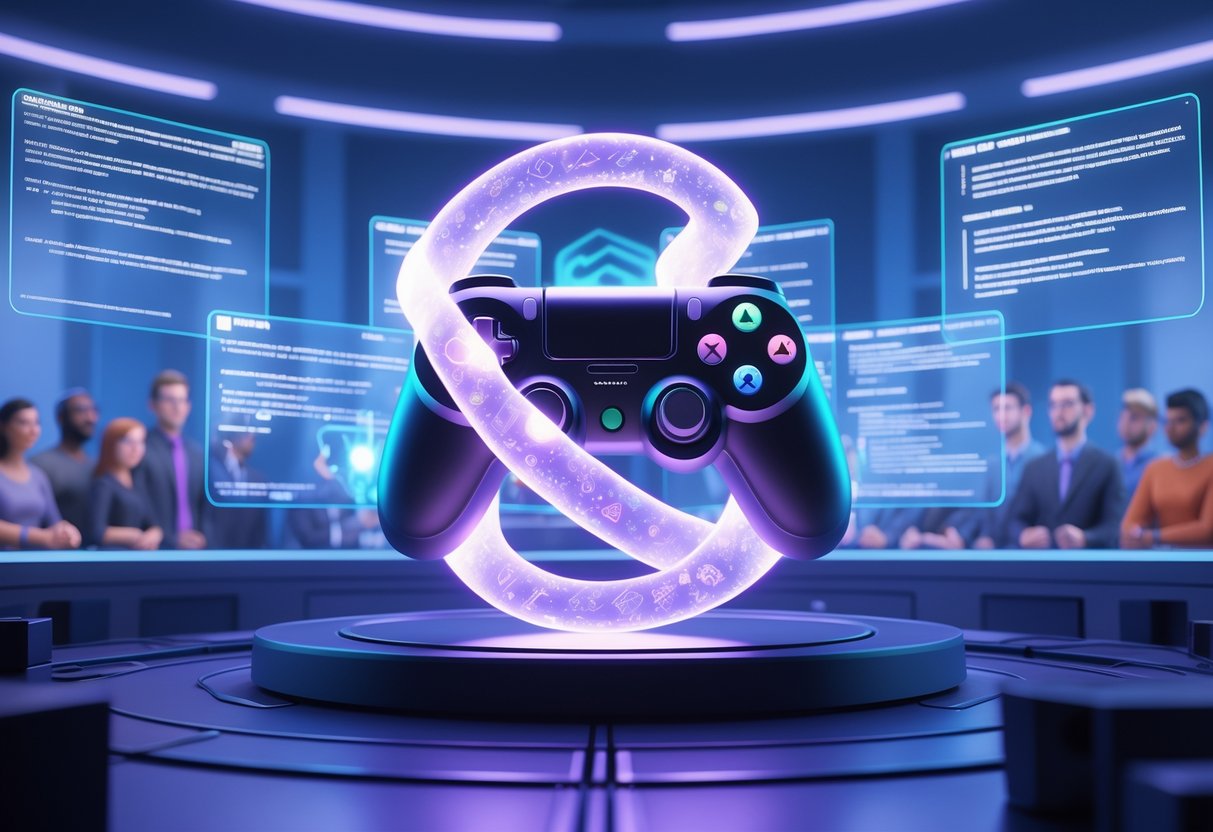
Video games deal with unique copyright challenges. They mix code, art, music, and interactive features—all under intellectual property protection.
If you understand infringement risks, development impacts, and big legal cases, you’ll have a better shot at navigating this messy landscape.
Copyright Infringement and Intellectual Property
Video games bundle together a bunch of copyrightable parts, weaving a web of intellectual property rights. The source code, character designs, music, storylines, and visuals each get their own copyright.
Copyright infringement happens when someone uses these protected elements without permission. That includes:
• Copying game mechanics or code
• Using character designs or artwork
• Reproducing music or sound effects
• Taking storylines or dialogue
Game developers have to keep things original. Using copyrighted music without a licence? That’s a copyright violation. Copying character designs? Same deal.
User-generated content makes things even trickier. Players who create mods or share gameplay footage might step over the line without realising it. Now, a lot of games have rules about what players can and can’t share.
Fair use can protect commentary, criticism, or parody, but it’s not a free pass. The defence is pretty limited and definitely doesn’t cover commercial use.
How Copyright Law Shapes Game Development
Copyright law touches every part of game development, from the first idea to release day. Developers have to make sure assets are original or properly licensed.
Music licensing often eats up the biggest chunk of the copyright budget. Popular songs can cost a fortune, so plenty of studios just hire composers for original soundtracks.
When creating characters and assets, studios keep detailed records of their process. If a dispute pops up, they can prove their work is original.
Developers protect code repositories with copyright notices and licensing agreements. If they use open-source libraries, they have to follow specific licensing rules.
Publishers usually demand full copyright clearance before they’ll release a game. They check all assets to avoid infringement risks. Sure, it can slow things down, but it saves headaches later.
Important Legal Cases Relating to Gaming Copyright
A handful of big cases have shaped how copyright law works for video games. These decisions guide courts on gaming disputes.
Tetris Holding LLC v. Xio Interactive decided that game mechanics themselves aren’t protected by copyright, but the specific look and feel can be.
The Oracle v. Google case changed how developers use programming interfaces. It’s not just about gaming, but it affects how people build and license game engines and APIs.
Williams Electronics v. Artic International said video game audiovisual displays count as copyrightable works. That means the combo of graphics, sounds, and gameplay is protected expression.
Lately, courts have focused more on streaming and user-made content. They’re still figuring out how copyright works when players broadcast gameplay or create spin-offs.
These cases show that copyright infringement in gaming is complicated. Developers really need legal help when creating new content or using someone else’s material.
Types of DMCA Issues Affecting the Gaming Industry
The gaming industry runs into three big DMCA headaches—protecting original content, dealing with user mods, and untangling music licensing. These problems hit developers, players, and creators in different ways.
Game Content Takedowns
Game developers fight unauthorised distribution of their work all over the internet. That means illegal game copies, stolen character designs, and unauthorised use of assets.
Common takedown targets:
- Pirated games on file-sharing sites
- Mobile games copying characters or gameplay
- Websites hosting ROMs without permission
- Social media sharing copyrighted footage
Developers have to keep an eye on tons of platforms to spot infringement. A lot of gaming companies use specialised services to scan for stolen content.
International platforms make things even harder. Some sites just ignore takedown requests, so developers end up chasing expensive legal action.
Modding and User-Generated Content Disputes
The modding community lives in a legal grey zone. Players tweak games to add features, new characters, or even build whole new experiences.
Most mods use copyrighted code, but plenty of developers let it slide or even encourage it to keep fans engaged.
Hot spots for disputes:
- Mods using assets from other games
- Selling mods for profit
- Mods that bypass security or monetisation
- Fan games with copyrighted characters
Bethesda, for example, supports modding with official tools. On the flip side, some mobile game companies go after mods with DMCA claims.
Things get stickier when mods make money from donations or sales. That’s when developers often hit back with DMCA notices.
Music and Soundtrack Licensing Challenges
Music in games brings a whole new set of DMCA problems, especially for streamers and content creators. Games often include licensed music that developers can’t legally share outside the game.
Streamers get hit the hardest. If you play a game with copyrighted music, you could get a DMCA strike on Twitch or YouTube.
Major music headaches:
- In-game radio stations (think Grand Theft Auto)
- Licensed soundtracks in sports games
- Background music in cutscenes
- Victory or celebration songs
Some developers now offer “streamer mode” that swaps licensed music for royalty-free tracks. Cyberpunk 2077 and Fortnite do this to help content creators.
It’s not just streams. Fan videos, reviews, and even educational content can get flagged for using game music—even if they’re talking about the game itself.
DMCA and Online Gaming Platforms
Gaming platforms have their own DMCA headaches. Steam gets flak for its copyright complaint system, and Twitch deals with non-stop music and game content strikes. Communities are frustrated with automated systems and keep asking for change.
Case Study: Steam’s Approach to DMCA Complaints
Steam’s DMCA system gets a lot of criticism from both players and developers. The platform uses automated takedown tools that often remove legitimate content.
Steam’s DMCA process:
- Automated systems scan for copyrighted material
- Takedown notices mean instant content removal
- Appeals can drag on for weeks or even months
- False positives hit user-generated content all the time
Players get frustrated with Steam’s copyright claims. Workshop content, screenshots, and guides regularly disappear. Many folks think the whole system needs more human oversight.
Valve struggles to balance copyright protection with user freedom. Community feedback says the current system is just too aggressive and not well thought out.
DMCA Implementation on Twitch
Twitch streamers basically live with DMCA risks, especially with music and game footage. The platform’s rules have changed a lot since the 2020 crackdown.
- Soundtrack by Twitch (copyright-free music)
- Audio detection during streams
- Muted VOD segments for copyrighted content
- DMCA strike warnings and suspensions
Streamers have to juggle tricky rules for game music and sound effects. Even background music can set off copyright claims. Some creators mute all game audio just to be safe.
Twitch doesn’t really protect individual streamers. DMCA strikes add up and can get you banned for good. The platform’s safe harbour doesn’t cover creators themselves.
Online Gaming Community Reactions
Gaming communities aren’t exactly thrilled with stricter DMCA enforcement. Players argue the copyright systems don’t get gaming culture or fair use.
Community concerns:
- Overly broad takedown requests
- Copyright bots not understanding gaming content
- Automated systems hitting parody and commentary
- Less creative freedom for creators
Many gamers feel DMCA laws just don’t fit interactive media. They think gameplay footage should get treated differently from traditional content.
Content creators have adapted by sticking to royalty-free music and avoiding risky game elements. Some streamers only play games that give explicit streaming permission. Community solutions include sharing lists of stream-safe content.
The fight between copyright holders and gaming communities isn’t going away. Players keep pushing for better platform policies while copyright owners want tighter protection.
Modding: Legal Grey Areas and DMCA Enforcement
Game modding sits in a weird, tangled space where player creativity bumps into copyright law. PC modding usually brings fewer legal headaches than console modding, since consoles often force you to bypass security measures that might break DMCA rules.
Legal Status of Game Mods
PC modding usually gets more legal leeway than tinkering with consoles. Most PC game developers either welcome or at least tolerate modding communities. That makes things a bit safer for creators.
Console modding? That’s a different beast. You often have to break through security baked into the hardware. Doing that could land you in hot water under the Digital Millennium Copyright Act (DMCA).
The big difference comes down to technological protection measures, or TPMs. Console makers use these to lock down their systems. If you bypass them, you might face legal trouble.
Non-commercial mods for single-player games generally get more understanding. Developers know these mods don’t really compete with their own stuff. But if you’re selling mods or messing with multiplayer, the scrutiny gets a lot tougher.
Just a heads up: installing mod chips in consoles is risky business, especially if you’re selling them.
Intellectual Property Rights vs. Player Creativity
Modding communities kind of float in this “legal grey area.” Modders often wonder if their creations step over the copyright line. It’s confusing, since developers and players want different things.
End User Licence Agreements (EULAs) set the ground rules. Most people just click “agree” without reading. These agreements usually say you can’t make big changes or sell mods.
Copyright infringement gets more likely as mods get bigger and start making money. Cosmetic tweaks rarely cause problems. But if you build a total conversion that basically recreates another game, you’re asking for trouble.
When courts look at mods, they check a few things:
- Why the mod exists in the first place
- How people actually use it
- Any extra costs for consumers
- Whether there’s real copyright infringement
Here’s a quick tip: always check the game’s EULA and the developer’s stance before you start making big mods.
Famous Modding Disputes
Nintendo vs. Big House Tournament stands out as a well-known modding clash. In November 2020, Nintendo sent a cease-and-desist to shut down a Super Smash Bros. Melee event.
The whole thing revolved around Slippi software. This tool lets folks play the old Melee game online. Without it, you’re stuck with local play.
Nintendo said the software infringed their copyright. Organizers argued they needed Slippi for online matches. In the end, the event got cancelled, and fans were not happy.
United States vs. Reichert set a legal example for console mods. Jeffrey Reichert got convicted for installing mod chips in Nintendo Wiis and selling them.
The court zeroed in on willful intent. Reichert’s own online posts showed he knew he was in a grey area. That awareness helped seal his conviction.
European courts don’t always follow the US playbook. The European Court of Justice uses a balancing test, weighing TPM effectiveness, consumer costs, and whether there’s a legit reason to bypass tech.
Different countries enforce modding rules in their own way. That inconsistency makes it tough for modders to know their risks.
DMCA Takedown Procedure for Game Developers
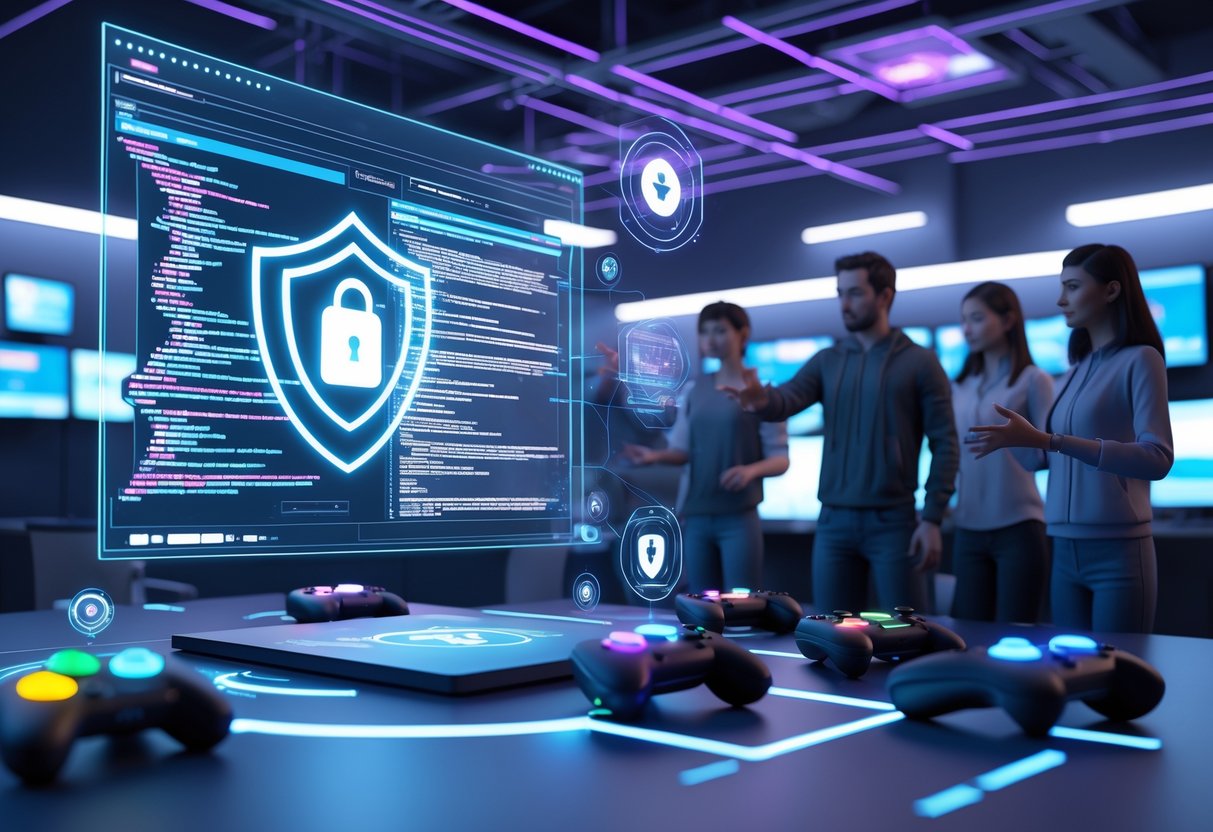
Game developers really need a plan for both sending DMCA claims and dealing with takedown notices that come their way. Understanding the consequences of bogus claims can protect your studio from some nasty surprises.
How to File a DMCA Takedown Notice
Filing a DMCA takedown isn’t just about filling in a form. You have to include the right legal details, or your claim might get tossed out.
Here’s what you need for a valid DMCA notice:
- Your contact info and signature
- Identification of the copyrighted material
- Where the infringing stuff lives (URLs or platforms)
- A good faith statement that the use isn’t authorized
- A statement that your info is accurate, under penalty of perjury
Before you file, gather proof you own your game assets. Keep design docs, contracts, and third-party licenses handy.
Most big platforms have online DMCA forms to speed things up. Steam, Google Play, and Apple’s App Store all have their own systems.
Here’s what you should collect:
- Copyright registration certificates
- Original source files with timestamps
- Proof of unauthorized sharing
- Screenshots of the copied content
After you submit, service providers usually tell the alleged infringer within a day or two. They should pull the content unless the user files a counter-notice.
Responding to Takedown Requests
Getting a DMCA notice doesn’t mean you’ve actually done something wrong. Plenty of notices are flawed or target fair content like parodies or reviews.
First, look closely at what the notice says. Make sure the person filing actually owns the copyright.
Your options:
- Remove the content if the claim holds up
- File a counter-notice if it doesn’t
- Try reaching out to settle things directly
Counter-notices need your contact info and your agreement to federal court jurisdiction. There’s some legal risk if the original claimant decides to sue.
Aaron Connolly, who knows the gaming industry well, says: “We see many developers panic when they get takedown notices, but legitimate fair use cases like gameplay reviews or parody mods often have strong defences.”
Before you file a counter-notice, ask yourself if your use qualifies as fair use, parody, or another exception.
Potential Consequences of False DMCA Claims
Filing a bogus DMCA claim can seriously backfire under Section 512(f) of the DMCA. You could end up paying damages and legal fees.
Penalties for false claims include:
- Attorney’s fees and court costs
- Actual damages suffered by the accused
- Possible perjury charges for lying
Bad faith takedowns are popping up more in gaming. Some companies file claims just to silence critics or knock out rivals.
Courts have ordered claimants to pay anywhere from hundreds to tens of thousands of pounds for false claims. The Electronic Frontier Foundation tracks some big cases where claimants got hit with big bills.
Heads up: even honest mistakes can cost you if you don’t check the facts before filing.
It’s almost always worth talking to an intellectual property lawyer before you send a takedown, especially if you’re dealing with user-generated content or fair use. Legal advice usually costs less than a mistake.
DMCA Abuse and Its Impact on Gamers and Developers
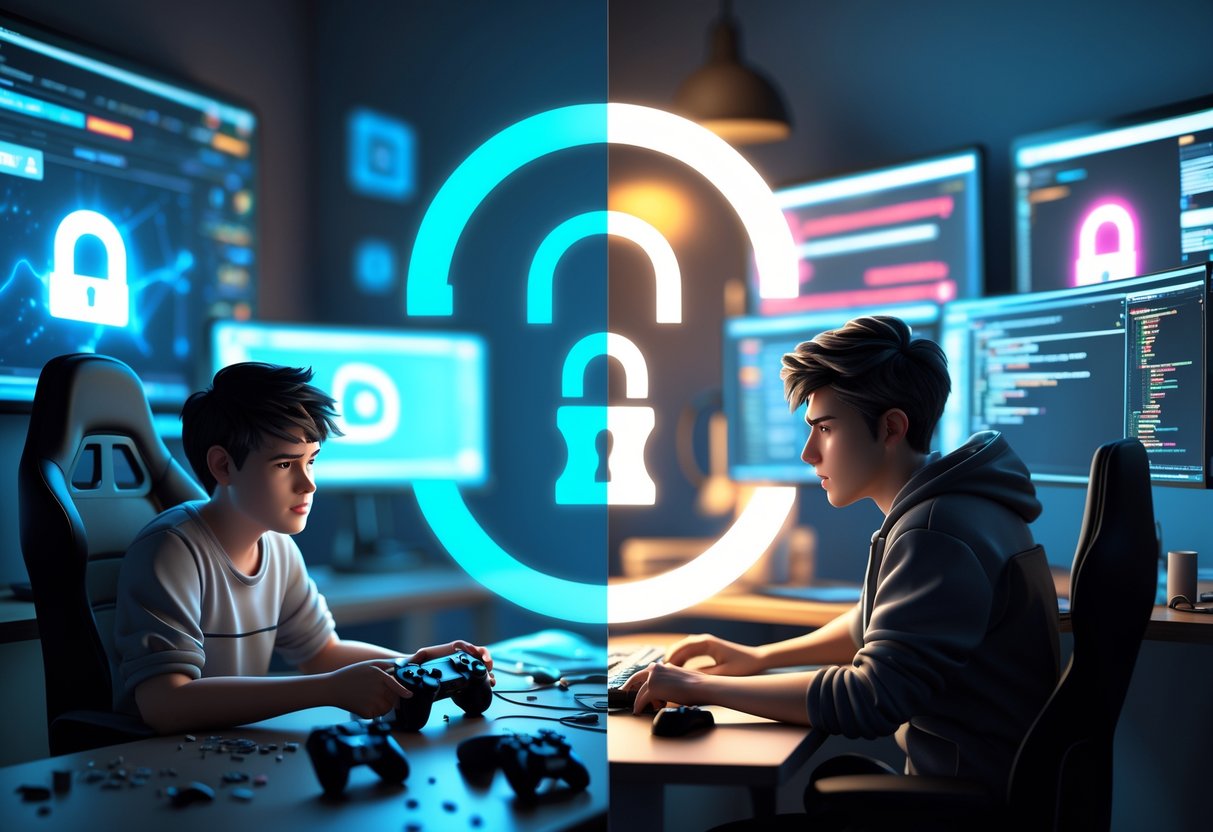
False copyright claims are flooding platforms like Steam, hitting legitimate creators with fake takedowns. Bad actors claim assets they don’t own, leaving creators with little recourse.
Common Forms of DMCA Abuse in Gaming
We’re seeing a bunch of nasty tactics used to weaponize copyright law. The most common? People claiming they own music, sound effects, or visuals they never made.
They go after popular mods and content, knowing creators can’t always prove ownership on the spot.
Revenge takedowns are another headache. When modding teams or rivals fall out, some file claims just to cause trouble, even after they settle things.
Automated claim farming is growing too. Some folks fire off dozens of fake claims, hoping nobody fights back.
| Abuse Type | Target | Success Rate |
|---|---|---|
| False asset claims | Popular mods | High |
| Revenge takedowns | Competing creators | Medium |
| Automated farming | Random content | Low but widespread |
Right now, the system tends to side with the person filing the claim. Once a DMCA notice lands, platforms like Steam yank the content first and ask questions later.
Protecting Against Fraudulent Claims
Defending against false claims takes some effort, but documentation really is your best friend.
Save everything from your creative process. Keep timestamps, source files, and logs. Snap screenshots as you work to prove when you made things.
Register your work if you can. It’s not required, but it helps a lot if things go south.
Stay connected in the gaming community. Having witnesses to your process can come in handy.
Here’s a quick tip: set up a folder for each project. Drop in concept art, progress shots, and dated files. It’s simple and can save you a ton of grief.
Join communities on Discord or Reddit too. Other devs often spot scams early and can back you up during disputes.
Don’t ignore takedown notices, even if they seem bogus. Platforms usually give you a short window to respond before they delete your stuff for good.
Effects on Content Creators and Streamers
DMCA abuse hits content creators hard, especially on Twitch and YouTube. Streamers can lose monetization or even get banned after false claims.
Some copyright holders grab ad revenue from videos with their “content,” even if the claim is fake.
The community feels it when mods vanish from Steam Workshop. Projects like UI Overhaul Dynamic for Stellaris and PropHunt for Garry’s Mod have been taken down, affecting thousands.
Smaller creators can’t always afford lawyers to fight back. We’ve heard from modders who just quit after a few bogus takedowns.
The psychological impact is real. Creators talk about anxiety and second-guessing before sharing anything new. Some just stick to private Discords, which limits what the community can enjoy.
Twitch streamers sometimes avoid certain games or mods to dodge copyright strikes. That self-censorship shrinks content variety and hurts the gaming scene overall.
Copyright Protection Strategies for Gaming Companies
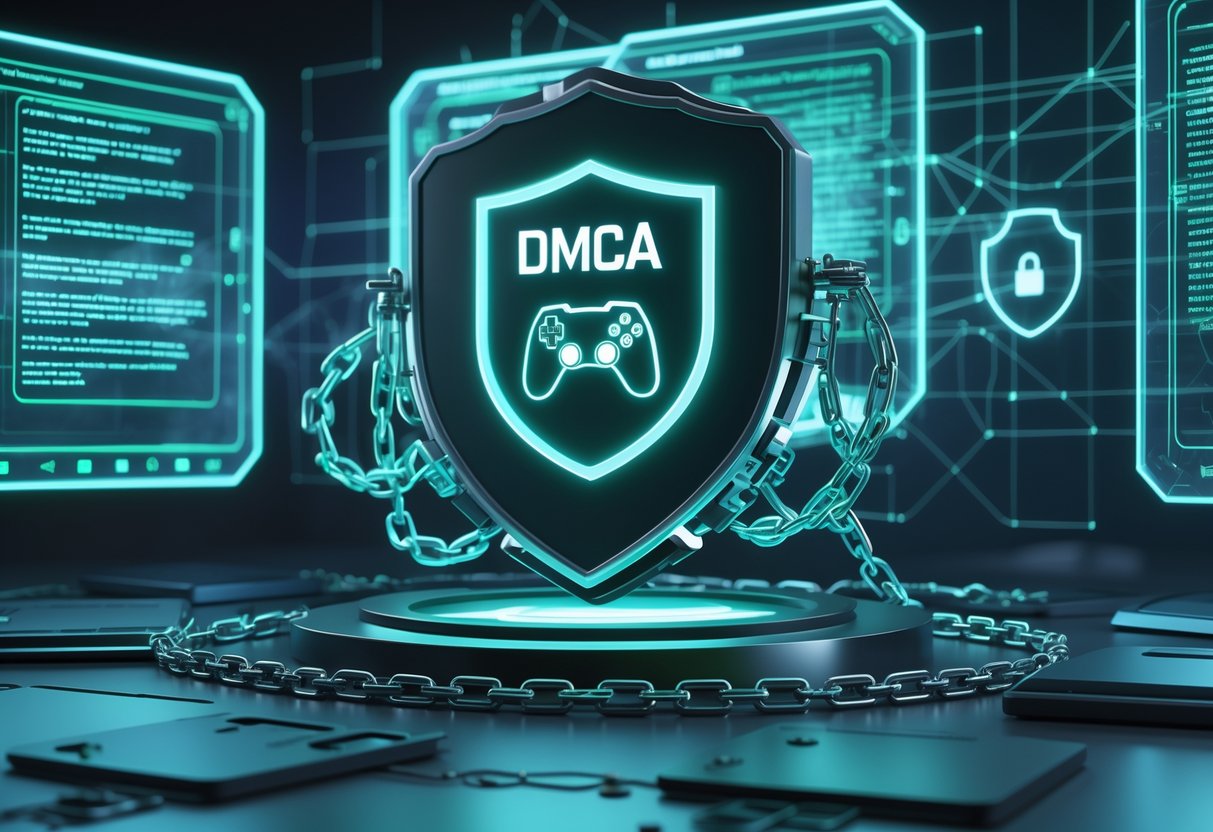
Gaming companies need to lock down their creative work and business interests. That means using technical safeguards, registering their stuff properly, and keeping good vibes with their communities.
Implementing Digital Rights Management
Digital Rights Management (DRM) puts up barriers against copying and piracy. We suggest companies use server-based authentication so players have to prove they own the game before playing.
Modern DRM can include:
- Always-online checks
- Encrypted files and assets
- Hardware fingerprinting to stop sharing
- Regular security updates
Many companies mix things up. Single-player games might use lighter DRM, while multiplayer titles lean on server checks.
But be careful: heavy-handed DRM can annoy players and tank your reviews.
Balance is key. Steam’s model works pretty well—players can go offline for a while but still keep games protected.
Best Practices for Copyright Registration
Registering your copyrights gives you legal muscle. We recommend registering code, art, music, characters, and storylines separately when possible.
Here’s a rough timeline:
- Before launch: register the main game pieces
- After launch: register updates and new content
- As you go: document every creative asset with timestamps
Keep records from development—screenshots, design docs, and version logs help prove you made it first.
International protection takes some planning. The Berne Convention covers a lot of countries, but registering in big markets like the US or UK gives you more options.
Pro tip: automate your documentation so every asset gets timestamped during development.
Balancing Protection and Community Engagement
Communities bring a ton of value through mods, streams, and fan art. Smart companies set clear rules that protect their IP but still let fans create.
Some ideas:
- Publish official modding guidelines
- Offer licenses for content creators
- Write up fair use policies for streaming
- Share official assets for fan projects
Companies like Mojang (Minecraft) thrive by encouraging creativity within limits. Their commercial rules let streamers make money but keep core rights safe.
In practice, that means:
- Letting people share gameplay footage with credit
- Allowing non-commercial fan art
- Blocking asset ripping and redistribution
- Controlling commercial spin-offs
Respond to DMCA violations in a fair, measured way. Automated takedowns can alienate your biggest fans.
Now’s a good time to draft community guidelines that spell out what’s allowed and what’s not.
The Role of Copyright Holders in DMCA Disputes
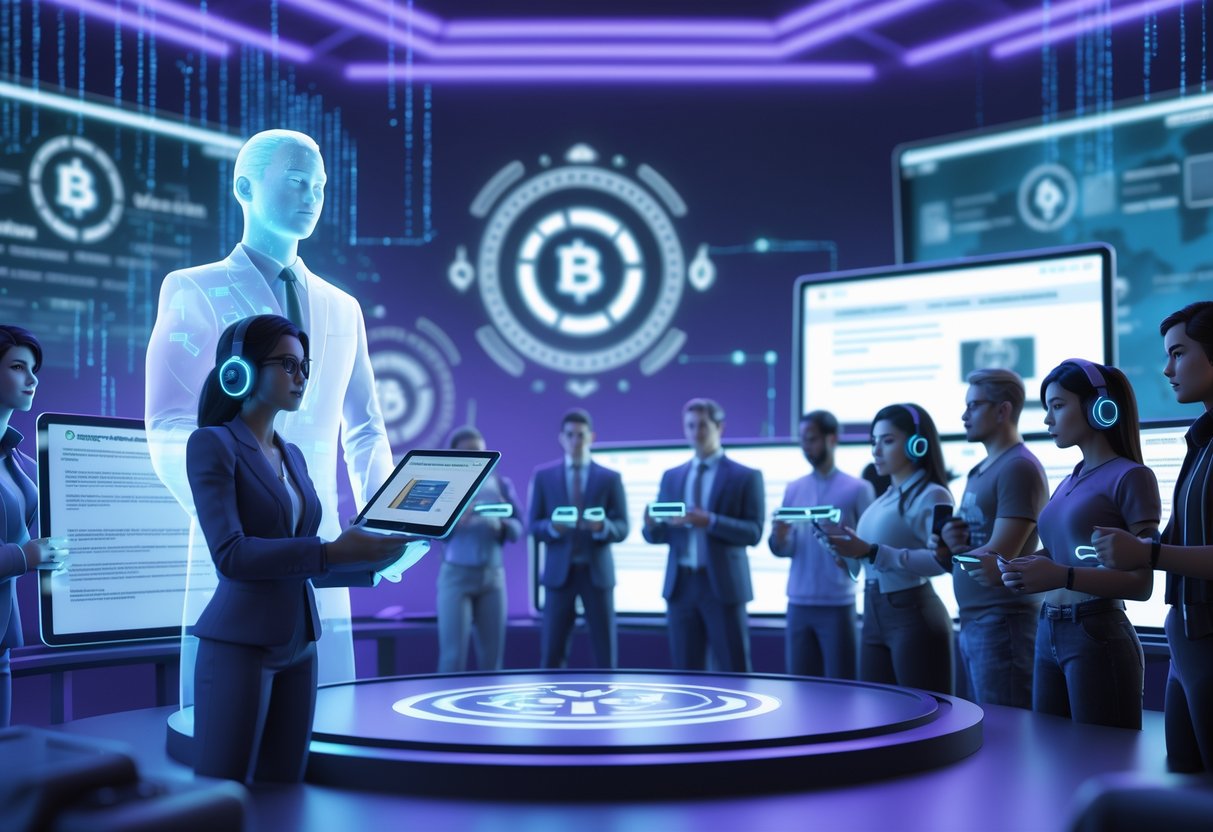
Copyright holders play a pretty hands-on role when they file DMCA takedowns in gaming disputes. They work directly with platforms like Twitch and YouTube, all while juggling the risk of community backlash from popular streamers and their fans.
Responsibilities Throughout the Takedown Process
Copyright holders have to stick to some strict legal steps when they file DMCA takedowns against gaming content. They need to pinpoint exactly what copyrighted material shows up in streams or videos.
Key responsibilities include:
- Giving accurate details about the copyrighted work
- Identifying the exact spot of the infringing content
- Proving they own or represent the copyright
- Swearing the takedown request is made in good faith
Video game companies run into some unique headaches here. Background music in games might belong to totally different record labels.
This tangled web of ownership means they must clearly show who owns what.
Warning: If someone files a false DMCA claim, they could face perjury charges and legal trouble.
Copyright holders can’t just wave their hands and claim ownership. They have to prove they have the legal right to request takedowns.
When it comes to gaming, this might involve several parties—game developers, music publishers, and sometimes even voice actors.
Collaboration with Online Platforms
Gaming platforms have set up systems to work with copyright holders on DMCA disputes. Twitch, for example, offers Soundtrack by Twitch so streamers can sidestep music copyright headaches.
YouTube uses Content ID to automatically spot copyrighted stuff. This way, copyright holders can sometimes make money from gaming videos instead of just taking them down.
Platform collaboration methods:
- Automated detection tools
- Direct lines of communication
- Appeals processes
- Revenue sharing deals
Some game developers have started writing up clear policies for streaming their games. CD Projekt Red, for instance, openly encourages people to stream their titles.
Others put limits on things like unreleased content or certain music tracks.
We’ve seen some good partnerships pop up between copyright holders and gaming platforms. These tend to focus on education rather than immediate punishment.
Platforms often send warnings before they hand out strikes.
Community Backlash and Public Relations Challenges
Gaming communities don’t usually take DMCA takedowns against beloved streamers lightly. Copyright holders risk boycotts and a wave of bad publicity when they go after popular creators.
Common community reactions include:
- Organizing boycotts of games or music
- Launching social media campaigns against copyright holders
- Raising money for streamers who get hit
- Jumping ship to other platforms
Record labels have gotten some serious heat for DMCA claims against gaming streamers. Universal Music Group, for example, got slammed for going after streamers playing games with licensed music.
Gaming companies have to walk a fine line between protecting their copyrights and keeping the community on their side. If they push DMCA enforcement too hard, they risk losing influencers who help promote their games.
Quick win: A lot of copyright holders now talk directly to gaming communities on social media, explaining their policies and reasons.
Some companies have even switched things up completely. They work with streamers to find solutions instead of firing off takedowns right away.
This might mean offering alternative music choices or setting up revenue-sharing arrangements.
The trick is communicating clearly about copyright rules before problems start. Gaming communities usually respond better to upfront guidelines than surprise takedowns.
Evolving Legal and Technological Trends in DMCA for Gaming
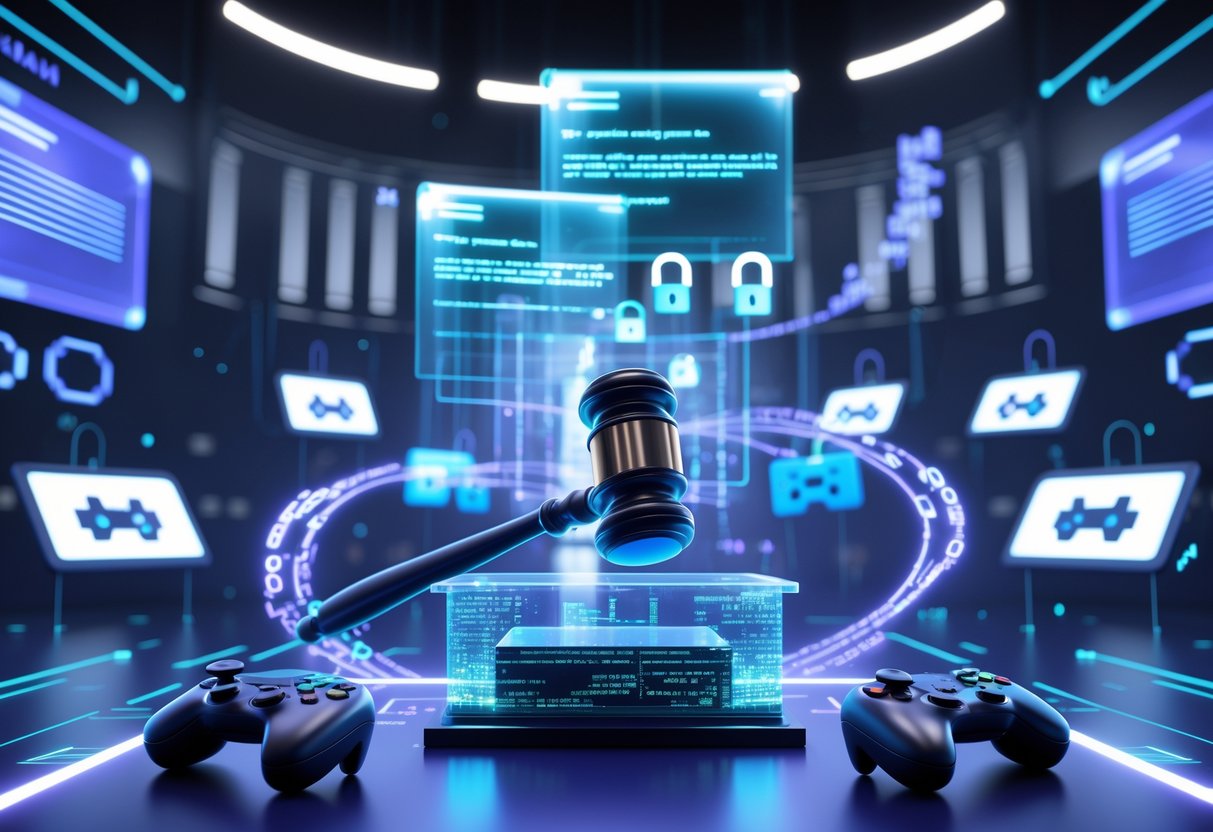
The gaming industry keeps facing big shifts in copyright enforcement. New DMCA procedures, global regulations, and emerging technologies are changing how content protection works.
These changes hit streamers, content creators, and platforms everywhere.
Recent Changes in DMCA Procedures
Gaming platforms have rolled out automated detection systems that scan streams and videos in real time. Twitch’s AudioMagic and YouTube’s Content ID can catch copyrighted music within seconds.
The DMCA counter-notification process is now easier to use. Creators can push back against false claims with simple online forms instead of wrestling with legal paperwork.
Safe harbour protections for platforms have gotten stronger. Sites like Steam and Discord now have clearer rules about when they must take content down and when they can leave it up.
New repeat infringer policies mean accounts get suspended automatically after three confirmed strikes. Still, gaming content sometimes gets exceptions for fair use commentary during streams.
Response times have sped up too. Platforms have to deal with valid DMCA notices within 48 hours for live content now, not weeks.
Global Differences in Copyright Enforcement
European Union rules aren’t the same as US DMCA laws. The Copyright Directive makes platforms get music licences ahead of time, not just after takedown requests.
United Kingdom mostly sticks to pre-Brexit EU law. Streamers there get broader fair dealing rights for criticism and review.
Asian markets? They’re all over the place. Japan cracks down on anime game soundtracks, while South Korea seems more interested in gambling-related gaming content.
Australia and Canada use DMCA-like systems but give creators a bit more protection. If someone files a bogus claim, they could face financial penalties.
Regional licensing agreements can be a mess. A song might be cleared for streaming in the US but still get blocked in Europe on the same platform.
Gaming companies often use geo-blocking to handle these different rules from place to place.
The Future of Copyright Law in Online Gaming
Artificial intelligence is about to shake up DMCA enforcement with predictive content scanning. Soon, systems might spot copyright issues before creators even post content.
Blockchain technology could lead to decentralised copyright databases. That would help confirm ownership and automate licensing payments.
Real-time licensing is on the horizon. Streamers might soon pay tiny fees automatically to use copyrighted music during their broadcasts.
Creator-friendly policies are picking up steam. Platforms are realizing that if they clamp down too hard, they hurt their own communities.
Legislators are looking at updates for 2026. They’re considering gaming-specific exemptions because interactive entertainment is just… different.
Cross-platform standards are probably coming. Big gaming companies are talking about unified ways to handle DMCA across services and regions.
Community Advocacy and Calls for DMCA Reform
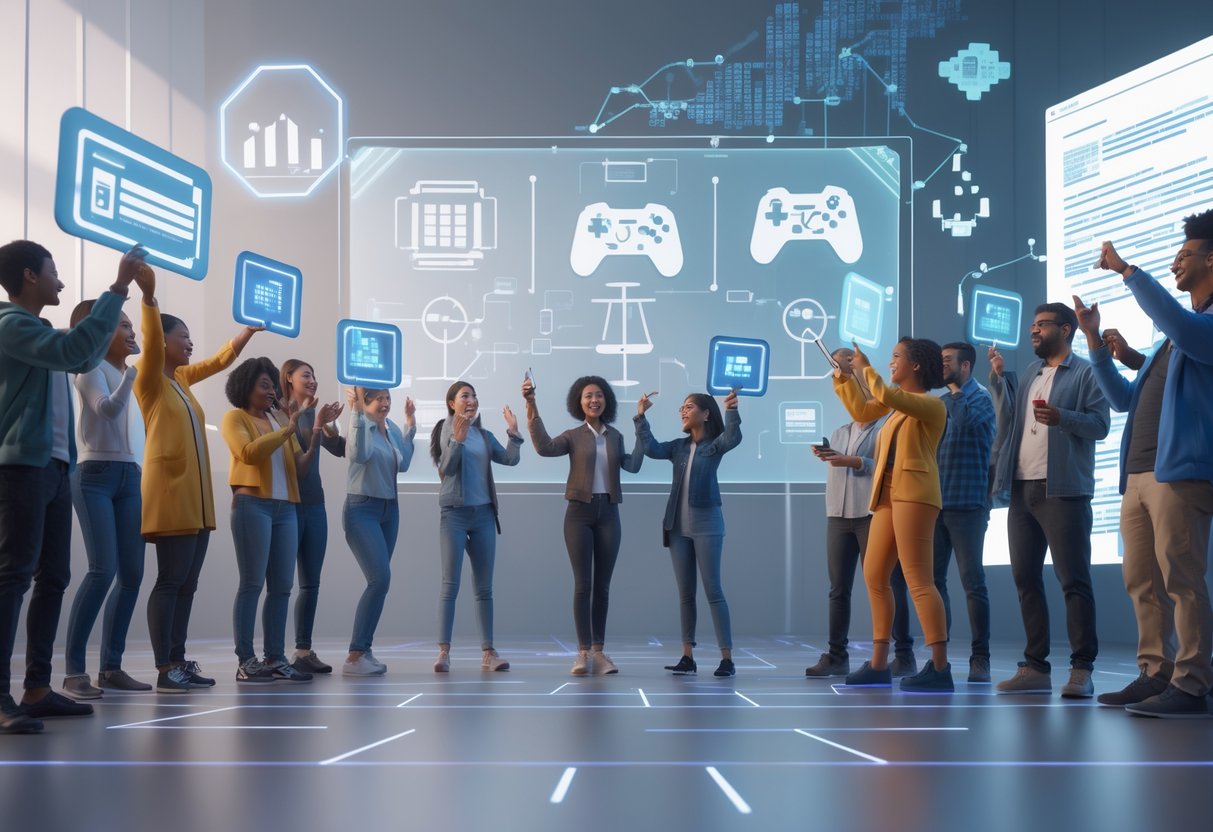
Gamers and content creators are pushing hard for changes to copyright law. They want better protection from bogus claims and real consequences for companies that abuse the system.
Grassroots Efforts for Legal Change
The gaming community has jumped into action with petitions to spotlight DMCA problems. Streamers and creators share stories about unfair takedowns wrecking their careers.
They focus on real-life examples of systems gone wrong. People point to times when legit gameplay videos got removed for no good reason.
Key advocacy groups include:
- Software Preservation Network
- Public Knowledge
- Independent streamer collectives
Thousands have signed petitions calling for reform. Gaming forums light up with copyright talk every day.
Reddit is packed with advice on how to fight back against false claims.
This grassroots movement links up solo creators with bigger advocacy groups. That way, their voices get a lot harder to ignore.
The Push for Stricter Claimant Verification
Gaming advocates want companies to actually prove they own the content before filing claims. Right now, just about anyone can submit a DMCA takedown with no real checks.
Major problems with the current system:
- No identity checks for claimants
- Automated systems rubber-stamp most requests
- Creators have to prove they’re innocent
We’re seeing more people call for mandatory verification. This would make copyright holders show proof of ownership before filing.
Some want legal signatures on every takedown request. Others think platforms should verify company registrations before accepting claims.
Game publishers actually support these ideas too, since false claims hurt their legit business.
Penalties for False DMCA Claims
The law technically punishes false claims, but it almost never happens. Gaming advocates want platforms to automatically punish repeat offenders.
Proposed penalties include:
- Temporary bans on filing new claims
- Financial compensation for creators who get hit
- Public lists of those who file false claims
There should be real consequences here. A bogus claim can wipe out a creator’s income for weeks, and current penalties just don’t cut it.
Some folks suggest a “three strikes” rule for bad actors. Platforms could flag accounts that keep filing false claims, then hit them with tougher restrictions.
Others want company employees who file dodgy claims to be personally liable. That would definitely make them think twice.
The challenge is finding the right balance between real copyright protection and creator rights. Gamers admit piracy is a thing, but they want fair processes that don’t smash legal content.
Frequently Asked Questions
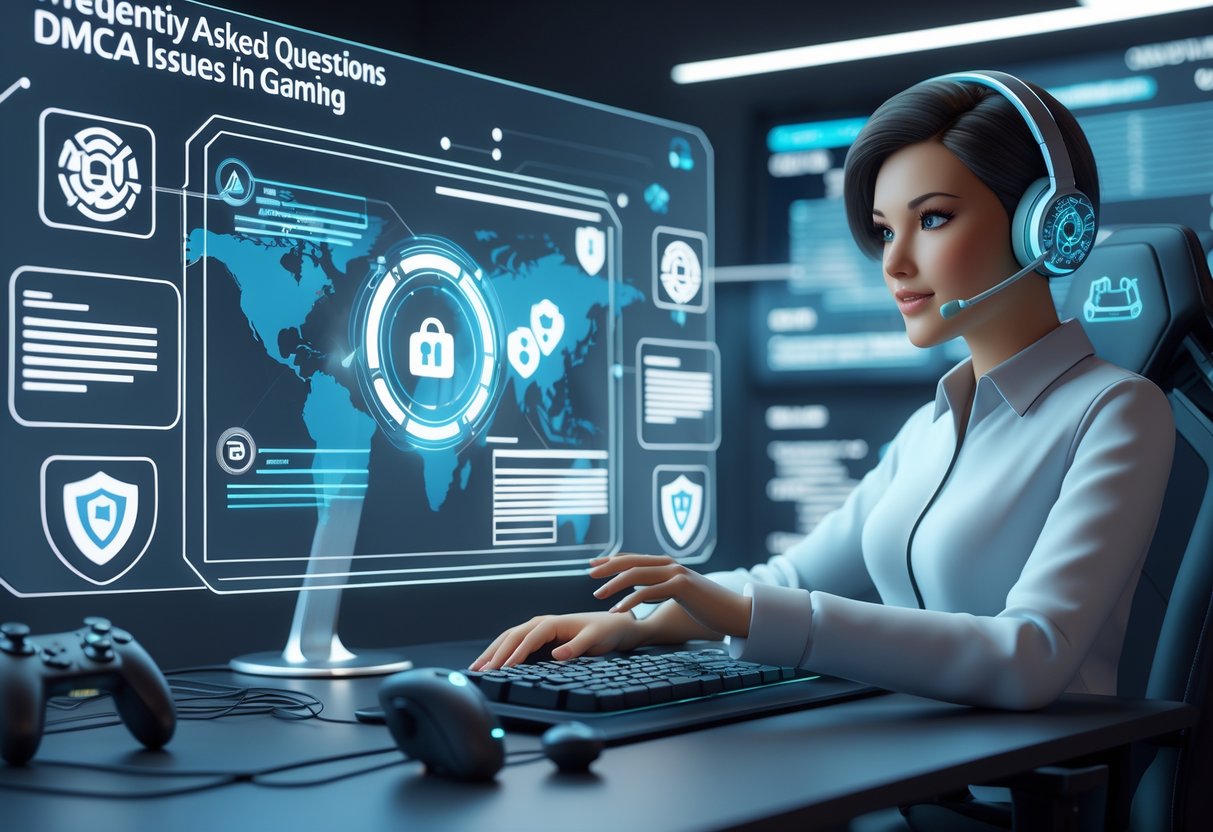
Gaming copyright and DMCA law can get pretty confusing. People have questions about preserving old games, sharing historical content, and joining preservation projects.
Here are some answers for gamers, collectors, and enthusiasts who want to help save gaming history.
How can I legally preserve video games without infringing on copyright?
You can make personal backup copies of games you own, and that usually falls under fair use in most places.
But if you start giving those copies to others, you cross the line into copyright infringement. It really comes down to personal use versus sharing.
Libraries and schools get more leeway under certain exemptions. The Copyright Office sometimes grants special rules for preservation by qualified organizations.
If you’re a collector, focus on keeping your physical media and documentation safe, not spreading ROM files around. Hang on to receipts and records to back up your fair use claims.
What are the guidelines for archiving video game magazines in compliance with DMCA?
Archiving magazines you’ve bought for your own reference is generally fine under fair use. Scanning them just for yourself usually doesn’t break the rules.
But posting full magazine scans online almost always steps on publisher rights. Most gaming magazines keep their copyright for decades.
Academic libraries can archive magazines under certain education exemptions, but they have to stick to strict rules on access and sharing.
It never hurts to ask publishers for permission before you share old content. Some publishers actually appreciate preservation efforts and might give you the green light.
How does the DMCA affect the sharing of historical video game content?
The DMCA treats old gaming content just like new stuff. Age doesn’t magically erase copyright.
Game companies can still send takedown notices for content from decades ago. We’ve seen publishers go after ROM sites hosting games from the ’80s and ’90s.
Fair use might protect some historical sharing, especially for education or commentary. But uploading full games or manuals usually goes too far.
Screenshots, gameplay clips, and review videos are more likely to fall under fair use. Stick to transformative uses, not just straight-up redistribution.
What steps should I take when receiving a DMCA takedown notice for gaming-related content?
First off, don’t freak out—read the notice closely. DMCA notices have to list specific details about what’s allegedly infringing.
Take down the content right away if you think the claim is legit. Most platforms make it pretty easy to remove stuff and avoid more trouble.
If you believe the takedown is wrong, you can file a counter-notice. You’ll need to swear under penalty of perjury that your content doesn’t infringe.
Keep records of everything: the original notice, your response, and any back-and-forth with the copyright holder.
What are the legal considerations for donating video game materials to preservation efforts?
You can donate physical games, consoles, and accessories to preservation groups without much hassle. Owning physical media usually means you can transfer it.
Digital games are trickier because of licence restrictions. Most digital purchases are just licences, not actual ownership, so you can’t always transfer them.
Check out the legal status and preservation methods of the organization you’re donating to. Well-established groups usually have better systems for handling this stuff.
Add any documentation about your original purchase if you can. That makes it easier for preservation organizations to prove they got the materials legitimately.
In terms of the DMCA, how can I contribute to video game history projects without violating copyright?
Try focusing on your own content about games, not just sharing copyrighted stuff. When you write reviews, dive into analysis, or add some historical context, you usually fall under fair use. That’s a safer bet.
Add things like metadata, release dates, or just the basic facts about games. Nobody can copyright this info, and honestly, it helps out the preservation community without putting you at risk.
Share your gaming memories and experiences. Maybe do interviews or jot down your thoughts. Personal stories give projects depth, and you don’t have to worry about copyright there.
Take photos at gaming events, conventions, or those quirky community meetups. Your own pictures tell a story and document history, all without stepping on any copyright toes.

